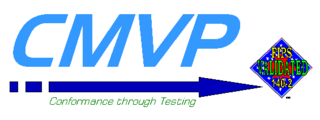
Analytical chemistry studies and uses instruments and methods to separate, identify, and quantify matter. In practice, separation, identification or quantification may constitute the entire analysis or be combined with another method. Separation isolates analytes. Qualitative analysis identifies analytes, while quantitative analysis determines the numerical amount or concentration.
In measurement technology and metrology, calibration is the comparison of measurement values delivered by a device under test with those of a calibration standard of known accuracy. Such a standard could be another measurement device of known accuracy, a device generating the quantity to be measured such as a voltage, a sound tone, or a physical artifact, such as a meter ruler.
Conformance testing — an element of conformity assessment, and also known as compliance testing, or type testing — is testing or other activities that determine whether a process, product, or service complies with the requirements of a specification, technical standard, contract, or regulation. Testing is often either logical testing or physical testing. The test procedures may involve other criteria from mathematical testing or chemical testing. Beyond simple conformance, other requirements for efficiency, interoperability, or compliance may apply. Conformance testing may be undertaken by the producer of the product or service being assessed, by a user, or by an accredited independent organization, which can sometimes be the author of the standard being used. When testing is accompanied by certification, the products or services may then be advertised as being certified in compliance with the referred technical standard. Manufacturers and suppliers of products and services rely on such certification including listing on the certification body's website, to assure quality to the end user and that competing suppliers are on the same level.

Metrology is the scientific study of measurement. It establishes a common understanding of units, crucial in linking human activities. Modern metrology has its roots in the French Revolution's political motivation to standardise units in France when a length standard taken from a natural source was proposed. This led to the creation of the decimal-based metric system in 1795, establishing a set of standards for other types of measurements. Several other countries adopted the metric system between 1795 and 1875; to ensure conformity between the countries, the Bureau International des Poids et Mesures (BIPM) was established by the Metre Convention. This has evolved into the International System of Units (SI) as a result of a resolution at the 11th General Conference on Weights and Measures (CGPM) in 1960.

Nondestructive testing (NDT) is any of a wide group of analysis techniques used in science and technology industry to evaluate the properties of a material, component or system without causing damage. The terms nondestructive examination (NDE), nondestructive inspection (NDI), and nondestructive evaluation (NDE) are also commonly used to describe this technology. Because NDT does not permanently alter the article being inspected, it is a highly valuable technique that can save both money and time in product evaluation, troubleshooting, and research. The six most frequently used NDT methods are eddy-current, magnetic-particle, liquid penetrant, radiographic, ultrasonic, and visual testing. NDT is commonly used in forensic engineering, mechanical engineering, petroleum engineering, electrical engineering, civil engineering, systems engineering, aeronautical engineering, medicine, and art. Innovations in the field of nondestructive testing have had a profound impact on medical imaging, including on echocardiography, medical ultrasonography, and digital radiography.
The Federal Information Processing Standard Publication 140-2,, is a U.S. government computer security standard used to approve cryptographic modules. The title is Security Requirements for Cryptographic Modules. Initial publication was on May 25, 2001, and was last updated December 3, 2002.

The Cryptographic Module Validation Program (CMVP) is a joint American and Canadian security accreditation program for cryptographic modules. The program is available to any vendors who seek to have their products certified for use by the U.S. Government and regulated industries that collect, store, transfer, share and disseminate "sensitive, but not classified" information. All of the tests under the CMVP are handled by third-party laboratories that are accredited as Cryptographic Module Testing Laboratories by the National Voluntary Laboratory Accreditation Program (NVLAP). Product certifications under the CMVP are performed in accordance with the requirements of FIPS 140-3.
Various governments require a certification of voting machines.
ISO/IEC 17025General requirements for the competence of testing and calibration laboratories is the main standard used by testing and calibration laboratories. In most countries, ISO/IEC 17025 is the standard for which most labs must hold accreditation in order to be deemed technically competent. In many cases, suppliers and regulatory authorities will not accept test or calibration results from a lab that is not accredited. Originally known as ISO/IEC Guide 25, ISO/IEC 17025 was initially issued by ISO/IEC in 1999. There are many commonalities with the ISO 9000 standard, but ISO/IEC 17025 is more specific in requirements for competence and applies directly to those organizations that produce testing and calibration results and is based on more technical principles. Laboratories use ISO/IEC 17025 to implement a quality system aimed at improving their ability to consistently produce valid results. Material in the standard also forms the basis for accreditation from an accreditation body.
The Common Criteria model provides for the separation of the roles of evaluator and certifier. Product certificates are awarded by national schemes on the basis of evaluations carried by independent testing laboratories.
Cryptographic Module Testing Laboratory (CMTL) is an information technology (IT) computer security testing laboratory that is accredited to conduct cryptographic module evaluations for conformance to the FIPS 140-2 U.S. Government standard.

Certified reference materials (CRMs) are 'controls' or standards used to check the quality and metrological traceability of products, to validate analytical measurement methods, or for the calibration of instruments. A certified reference material is a particular form of measurement standard.
An independent test organization is an organization, person, or company that tests products, materials, software, etc. according to agreed requirements. The test organization can be affiliated with the government or universities or can be an independent testing laboratory. They are independent because they are not affiliated with the producer nor the user of the item being tested: no commercial bias is present. These "contract testing" facilities are sometimes called "third party" testing or evaluation facilities.
The Security Content Automation Protocol (SCAP) is a method for using specific standards to enable automated vulnerability management, measurement, and policy compliance evaluation of systems deployed in an organization, including e.g., FISMA compliance. The National Vulnerability Database (NVD) is the U.S. government content repository for SCAP. An example of an implementation of SCAP is OpenSCAP. SCAP is a suite of tools that have been compiled to be compatible with various protocols for things like configuration management, compliance requirements, software flaws, or vulnerabilities patching. Accumulation of these standards provides a means for data to be communicated between humans and machines efficiently. The objective of the framework is to promote a communal approach to the implementation of automated security mechanisms that are not monopolized.

In metrology, a standard is an object, system, or experiment that bears a defined relationship to a unit of measurement of a physical quantity. Standards are the fundamental reference for a system of weights and measures, against which all other measuring devices are compared. Historical standards for length, volume, and mass were defined by many different authorities, which resulted in confusion and inaccuracy of measurements. Modern measurements are defined in relationship to internationally standardized reference objects, which are used under carefully controlled laboratory conditions to define the units of length, mass, electrical potential, and other physical quantities.

NSF is a product testing, inspection, certification organization with headquarters in Ann Arbor, Michigan. NSF also offers consulting and training services worldwide.

National Accreditation Board for Testing and Calibration Laboratories (NABL) provides accreditation to Conformity Assessment Bodies (Laboratories) in India. NABL Schemes include Accreditation (Recognition) of Technical competence of testing, calibration, medical testing laboratories, Proficiency testing providers (PTP) & Reference Material Producers (RMP) for a specific scope following ISO/IEC 17025, ISO 15189, ISO/IEC 17043 & ISO 17034:2016 Standards. It has Mutual Recognition Arrangement (MRA) with Asia Pacific Accreditation Cooperation (APAC), International Laboratory Accreditation Cooperation (ILAC).

From the beginning of 2015, the Centre for Metrology (MIKES) (Finnish: Mittatekniikan keskus; Swedish: Mätteknikcentralen) formerly the Centre for Metrology and Accreditation has been part of VTT Technical Research Centre of Finland Ltd. As the National Metrology Institute of Finland, MIKES is responsible for the implementation and development of the national measurement standards system and realisation of the SI units in Finland. MIKES designates other National Standards Laboratories in Finland. Moreover, MIKES performs research in metrology, i.e., in measurement science. MIKES’s customers include both Finnish and international companies as well as the public sector. Other national metrology institutes are for example PTB (Germany), NPL (UK), NMIJArchived 2012-11-08 at the Wayback Machine (Japan), NIST (USA), and Główny Urząd Miar (Poland). As a part of VTT MIKES operates under the administrative domain of the Ministry of Employment and the Economy.
The National Association of Testing Authorities (NATA) is the recognised national accreditation authority for analytical laboratories and testing service providers in Australia. It is an independent, not-for-profit organisation, governed by a board of directors that has representation from NATA members, industry, government and professional bodies.








